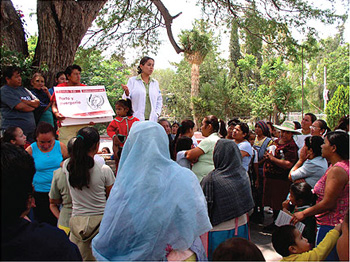Cash grants improve pregnancy outcomes
January - February, 2009 | Volume 8, Issue 1
 Dr. Veronica Rombero teaches participarnts in the Oportunidades
Dr. Veronica Rombero teaches participarnts in the Oportunidades
program in Huimilpan, MexicoCash grants of $15 a month along with counseling improves birth outcomes among poor, rural, pregnant Mexican women, a Fogarty-sponsored study reveals. But another study says giving money under the same program to improve health behavior among adults may backfire.
Researchers Dr. Sarah L. Barber and Dr. Paul J. Gertler of the University of California, Berkeley, measured the effect of government stipends to 712 rural women in seven Mexican states—conditioned on their making at least five prenatal health care visits, taking nutritional supplements and going to counseling aimed at making them better health care consumers.
Compared to the 180 women who did not get the cash, they received 12.2 percent more physical procedures, the study reported.
Since 1997, Mexico established the “Oportunidades” program aimed at breaking generational cycles of poverty by concentrating on infant and child care and, later, to improve adult health.
Using cash grants, the authors found, is associated with better neonatal health, suggesting, “This result is probably a manifestation of the program's empowerment goal, by encouraging beneficiaries to be informed and active health consumers.”
Their work appeared in Health Policy and Planning Advance Access published online Nov. 29, 2008.
But in the Journal of Nutrition of last November, Gertler coauthored with Dr. Lia C. H. Fernald and Dr. Xiaohui Hou an article examining the effect of cash on improving the diet of adults.
Despite the requirement for adults to visit health clinics and attend nutrition and hygiene seminars, the link between cash and health was dubious: there were increases in body mass index, overweight and blood pressure.
The authors speculate that although the extra cash went for healthful foods, adults may have been consuming nutritional supplements intended for children or buying more high-fat foods, or both. The findings, they say, “could provide critical guidance in relation to (conditional cash transfer) program design for countries such as Mexico, India, China, South Africa and Brazil.”
“Empowering women to obtain high quality care: evidence from an evaluation of Mexico's conditional cash transfer programme.” Sarah L Barber and Paul J Gertler. Health Policy and Planning Advance Access published online on November 20, 2008.
“Cash component of conditional cash transfer program is associated with higher body mass index and blood pressure in adults.” Lia C. H. Fernald, Paul J. Gertler and Xiaohui Hou. J. Nutr. 2008 Nov; Nutr. 2008 Nov;138(11):2250-7.
“A Payoff Out of Poverty?” Tina Rosenberg. New York Times Magazine. December 21, 2008, p. MM46.
To view Adobe PDF files,
download current, free accessible plug-ins from Adobe's website.